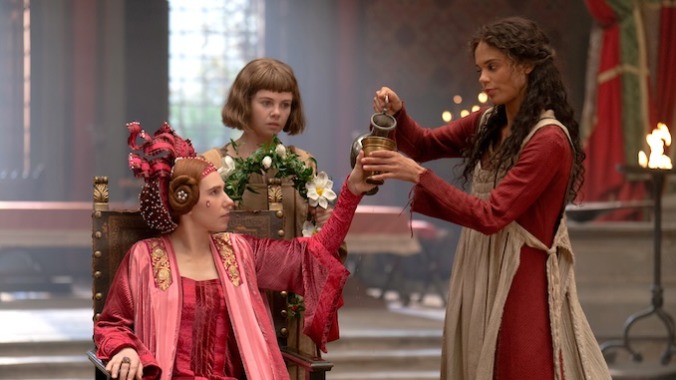News
Netflix Dramedy Overindulges to a Fault

A Netflix retelling of Giovanni Boccaccio’s The Decameron was not essentially on my 2024 bingo card—however in hindsight, it in all probability ought to have been. Showrunner Kathleen Jordan’s medieval romp is completely of our period, regardless of going down within the 14th century. In any case, it’s held up by none apart from the 4 horsemen of the present media zeitgeist: the anachronistic historic dramedy (see: Dickinson, My Girl Jane, Bridgerton), the “eat the wealthy” canon (see: White Lotus, The Menu, Triangle of Unhappiness), the schadenfreude of watching fairly, petty folks revert to base instincts whereas trapped in a single place (see: all of actuality tv, particularly Massive Brother, Love Island, and Bachelor in Paradise), and the irritating development of ever-increasing runtimes (see: every little thing ever). There’s additionally a darkish horse at its heart: it’s, unapologetically, concerning the pandemic—one thing most media has shied away from depicting.
It helps, absolutely, that the central pandemic of The Decameron is a far much less current, way more mythologized one. All of the soapy drama and raunchy slapstick stem from the characters’ determined makes an attempt to dam out the devastating actuality of the Black Demise, which continues to ravage Italy with no indicators of stopping. For all of the liberties the collection takes with the supply materials—and there are many; it’s a free adaptation the way in which a poncho is a free rain jacket—it will be close to unattainable to have any model of The Decameron not revolve across the plague. Boccaccio’s well-known e-book of quick tales is framed round it, with the tales in query all being informed by a gaggle of nobles trying to move the time as they disguise out from their native plague-ridden Florence in a ravishing nation villa. Like a scooped bagel, Jordan’s adaptation takes the premise of a pandemic-induced Massive Brother state of affairs and hollows out the remaining, changing the bready goodness of Boccaccio’s mosaic with heaps and plenty of filling. And look, I like cream cheese as a lot as the subsequent Jewish woman, however there may be such a factor as an excessive amount of of it, at which level I simply begin feeling a bit of sick. Regardless of the collection’ noble makes an attempt at class commentary and pandemic reverence, The Decameron gorges so totally—and for hour-long episodes at a time—on zany shenanigans of each bloodlust and common lust that it fails to depart a lot of a significant impression past a normal sense of extra. It’s not unhealthy, per se; I simply want there was rather less of it.
The Decameron is a real ensemble present, its characters combating over screentime and one another in equal measure. Women’ Zosia Mamet performs Pampinea, the aged (learn: 28) girl of the home, presiding over the villa within the conspicuous absence of her betrothed fiance, whom she’s by no means truly met. What she lacks in real connection to her lacking future husband she makes up for in pathological obsession and diabolical energy journeys, which her handmaiden Misia (Derry Women’ Saoirse-Monica Jackson, who places these massive eyes of hers to work in each scene) is the foremost recipient of. Their relationship usually feels akin to Veep’s Selina Meyer along with her bagman Gary Walsh, in all its poisonous, mutually dependent glory. Whereas Jackson is the Gary in that dynamic, Tony Hale (of Arrested Growth and, sure, Veep fame) dons his typical manic, desperate-to-please, only a tad unhinged typecast to function the villa’s steward, a pointy distinction to the steely frustration of Stratilia (Leila Farzad), the long-suffering cook dinner. There’s horny physician Dioneo (Amar Chadha-Patel, who rightfully known as his character a “medieval fuckboy”) and his hypochondriac affected person, the misogynistic, socially challenged nobleman Tindaro (Douggie McMeekin), who would really feel proper at residence on Reddit and in a fedora. And I might be remiss to not point out the lavender marriage between the hyper-religious and hyper-horny Neifile (Lou Gala) and the surprisingly likable opportunist Panfilo (Karan Gill). Stealing the present, although, is Intercourse Schooling’s Tanya Reynolds, who manages to convey a plausible humanity to the eccentric Licisca, a longtime servant to the bratty Filomena (Jessica Plummer) earlier than, on a violent whim, taking the mantle of noblewoman for herself. The present’s plot is straightforward: 1) These superbly costumed individuals are trapped in a beautiful Italian villa collectively. 2) Hijinks ensue.
Like many Netflix originals, The Decameron is commonly closely tropey, however not like its friends, that’s a truth it’s gleefully conscious of and infrequently explicitly leaning into. And whereas that’s enjoyable for a time, this purposeful soapiness makes not solely its twists and turns however its jokes at giant really feel all too telegraphed properly upfront. Whereas some characters do develop and develop, they’re precisely those you’ll count on; others solely sink to decrease depths, at all times within the methods you anticipate. The present is humorous in a broad sense—it’s humorous to look at folks act like idiots, certain. However when the baseline is so out-there, when every little thing is so over-the-top, it’s laborious for any second to face out, for any joke to startle fun out of the viewer. Particularly in Decameron’s early episodes, it feels as if the collection has about three jokes that it simply repeats at louder and louder decibels, every one outdoing the final iteration when it comes to sheer zaniness: God-obsessed Neifile needs to leap a person’s bones (and so does her husband), the unbearable Dioneo is, the truth is, unbearable, Pampinea is—gasp!—28, and so forth and so forth.
Probably the most distinctive side of The Decameron is, oddly sufficient, its willingness to interact (at the very least by proxy) with Covid-19—it’s not the one media that’s tried, actually, nevertheless it comes nearer to one thing approximating success than most others within the pandemic style, which generally do little greater than make you cringe in recognition. Decameron is unusual to look at in our (largely) post-Covid existence at this time; we might really feel tempted to roll our eyes on the characters’ makes an attempt to dam out the plague by shoving flowers up their nostrils, nevertheless it’s laborious to evaluate them too harshly, contemplating the so-called chief of the free world as soon as recommended injecting bleach into the human physique to struggle off our personal fashionable virus. There’s a sure kinship there, it’s true. Nevertheless, a lot of Jordan’s Decameron falls in need of really capturing the expertise of the pandemic—the calling card of that period was isolation, so it’s laborious to look at a Bachelor in Paradise-esque (and, usually, surprisingly violent) free-for-all and see a lot of ourselves in it. Once I say I resorted to my “base instincts” throughout Covid, I imply I sat on my sofa feeling unhealthy about myself whereas doom-scrolling via Twitter so lengthy my eyes glazed over. I don’t imply that I began attempting to set folks on fireplace.
In a variety of methods, Covid was a interval of stagnation for many people privileged sufficient to efficiently quarantine—of not figuring out what to do with ourselves, or the best way to discover goal in a life placed on maintain by international paranoia and the fixed (much more so than regular) concern of loss of life, or the best way to face the juxtaposition of 1 class’s self-imposed but peaceable home arrest with the truth that “important employees” have been pressured to labor on regardless. That’s one thing Boccaccio’s unique Decameron excelled at depicting: his is a story of individuals telling one another tales for lack of anything to try this would distract themselves from the devastation occurring simply past their partitions. The lavish chaos of the tales being informed are starkly contrasted with the nonetheless, purgatorial existence of the nobles who don’t have anything to do however sit, discuss, wait, and pray, in addition to with the horrors confronted by these unfortunate sufficient to go with out that privilege. Jordan’s Decameron, nevertheless, is altogether too busy—each too busy to correctly seize that pandemic feeling, and too busy, interval.
Maybe it’s this too-many-fingers-in-too-many-pies high quality that impressed the collection to carve out practically an hour for every episode—that means that the present clocks in at round eight hours in complete, which is… fairly a very long time, for a present as always over-the-top as this. Extra and extremity should not essentially unhealthy in and of themselves, however mockingly, they work greatest when in tandem with decisive restraint—of which The Decameron doesn’t possess a lot (if it did, maybe the present could be the half-hour caper it needs so badly to be). Zaniness and wackiness are all properly and good, however when every little thing, from the jokes to the tears, is ready at a ten for eight straight hours, it’s laborious to keep up enthusiasm, even when the present does. It will get, frankly, a bit wearying.
The Decameron isn’t all wackiness, nevertheless; Jordan makes many makes an attempt at real feeling in direction of the top of the collection’ run, however like the remainder of the present, they’re usually far too drawn out—overlong and extreme. Monologues abound within the ultimate episodes, every character breaking down in tears as they lastly come to phrases with elements of themselves they’d reasonably maintain hidden. However simply as nonstop, over-the-top antics lose their attraction after the freshness wears off, so too do emotional declarations. I discovered myself wishing for quieter moments, for a beat of respite from time to time—for connections shaped and emotions felt with out grand expository signposting to verify we see they’re there. Amidst all of it, there are genuinely illuminating, nice moments, like when a grieving Panfilo is informed, point-blank, that every little thing is horrible and he won’t ever recuperate, and he stops in his tracks, unable to do something however chuckle on the fact of it. However these bits usually really feel too few and much between—and they’re far between, contemplating that the episodes are, once more, an hour lengthy.
The Decameron (Jordan’s, not Boccaccio’s) is evidently a variety of issues. It’s “pandemic media,” via and thru; it’s a lusty slapstick a la medieval!Love Island, as actress Reynolds put it; it’s soapy drama chock stuffed with betrayals and tears; it’s a reasonably self-explanatory class commentary, with servants and masters waging catty warfare in opposition to one another evening and day. One factor it’s not, nevertheless, is The Decameron (Boccaccio’s, not Jordan’s). The Netflix collection takes the framing of Decameron, however none of its innards, save for a reference or two. And that’s a disgrace: The Decameron would possibly truly work extremely properly as an anthology present, with the surface plot persevering with across the edges of every episode’s “day” of tales.
I’m actually no prude for historic reverence (as an illustration, I cherished the sheer ridiculousness of My Girl Jane’s various historical past, whereby the “various” in query had so much to do with the inexplicable presence of Animorphs-style shapeshifters) however by altering the premise so dramatically, Jordan’s Decameron loses not solely its namesake, however its potential for originality. As a result of, when it comes right down to it, The Decameron does little that has not already been seen: it’s merely My Girl Jane + Love Island + White Lotus. And because it’s so busy attempting to perform all three of these oeuvres without delay—whereas additionally trying to determine a cohesive pandemic narrative—it falls just a bit shy of a hit in anybody class. It’s enjoyable to glut your self on, nevertheless it’s extra an indulgence than a satisfying meal, and by the point you attain the top, it’s laborious to not want you (just like the characters) had indulged rather less.
The Decameron is now streaming on Netflix.
Casey Epstein-Gross is a New York primarily based author and critic whose work will be learn in Paste, Observer, The A.V. Membership, Jezebel, and different publications. She will sometimes be discovered subjecting harmless bystanders to rambling, long-winded monologues about tv, movie, music, politics, or any certainly one of her strongly held opinions on bizarrely irrelevant matters. Comply with her on Twitter or electronic mail her at [email protected].
For all the most recent TV information, opinions, lists and options, observe @Paste_TV.
-

 News4 weeks ago
News4 weeks agoTimberwolves rally into overtime, then sink against the Houston Rockets
-

 News4 weeks ago
News4 weeks agoPaul Bernardo denied parole: Key moments from the hearing
-

 News4 weeks ago
News4 weeks agoEx-NHL star Paul Bissonnette hospitalized after restaurant brawl with 7 men in Arizona
-

 News4 weeks ago
News4 weeks agoKevin Durant, Bradley Beal combine for 46 points in return to action
-

 News4 weeks ago
News4 weeks agoWatch Oregon State football vs. Boise State: Channel, time
-

 News4 weeks ago
News4 weeks agoLive updates, channel for Week 14 game
-

 News4 weeks ago
News4 weeks agoPhilippines tightens security after VP Sara Duterte threatens assassination of Marcos if she is killed
-

 News4 weeks ago
News4 weeks agoFootball vs Kentucky on 11/23/2024 – Box Score
